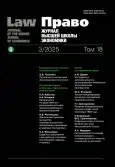Tools of Anti-Sanction Regulation in Global Cross-Border Space
- Authors: Shchukin A.1
-
Affiliations:
- Institute of Legislation and Comparative Law under the Government of the Russian Federation
- Issue: Vol 18, No 3 (2025)
- Pages: 154-180
- Section: Law in the Modern World
- URL: https://journal-vniispk.ru/2072-8166/article/view/318086
- DOI: https://doi.org/10.17323/2072-8166.2025.3.154.180
- ID: 318086
Cite item
Full Text
Abstract
Broadening range and changing the nature of unilateral sanctions by individual states has led to a new label of so-called «secondary» sanctions as opposed to more traditional «primary» sanctions. In response individual states of their alliances have approved laws aimed primarily at achieving political objectives through countersanctions. Almost all blocking laws in various countries contain a non-compliance clause prohibiting individuals and organizations from complying with, for example, US sanctions laws that apply outside the country and are extraterritorial. Blocking laws are important landmarks in the ongoing debate about the illegitimacy of secondary sanctions. The implementation of the non-compliance provision has been harshly criticized for creating a situation in which private operators face a dilemma: in that case compliance with the blocking law would violate the same US sanctions rules, and vice versa. The negative pressure experienced under sanctions is often related to the need of one state’s agents to adapt to the applicability of more than one legal system with opposite vectors of legislative policy. This is the legal reality and a natural consequence of today’s multinational world. By implementing the blocking laws as domestic legal mechanisms, states not only promote compliance with international standards of extraterritorial lawmaking by reducing references to blocked foreign norms, but also do protect their sovereign interests, regulating the extent of applicability of foreign law and reducing the number of normative obligations that the subjects of this state are sometimes forced to perform vis-à-vis a multitude of other legal orders. Meanwhile, geopolitical competition in this context has generated intense, acute legal rivalries and conflicts in the legal regulation of economic relations in a global cross-border space that have yet to be overcome for the successful development of modern civilization.
About the authors
Andrey Shchukin
Institute of Legislation and Comparative Law under the Government of the Russian Federation
Author for correspondence.
Email: pil@izak.ru
ORCID iD: 0000-0002-4539-6876
Candidate of Sciences (Law), Associate Professor.
34 Bolshaya Cheremushkinskaya Str., Moscow 117218, Russian Federation.References
Supplementary files








